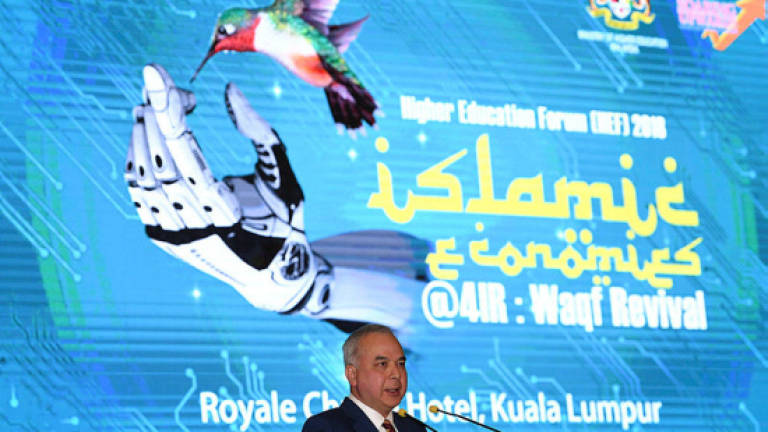Develop formal governance framework for waqf: Sultan Nazrin

KUALA LUMPUR: The institution of waqf needs to develop its own formal governance framework in order to strengthen governance within waqf infrastructure and develop a broader strategy to revive the use of waqf as a platform for Islamic social finance.
Sultan of Perak Sultan Nazrin Shah said the framework might include clear specification of the roles and responsibilities of the waqf trustee and authority, as well as a code of conduct outlining the need for the trustees to act in good faith in the best interest of the donors and beneficiaries.
He stressed that this move was important as the biggest impediment to the development of the waqf system was the perceived poor management of waqf institutions, as a result of limited regulation and supervision mechanisms.
"I believe that the internal governance of the waqf authorities must not be neglected and that there should be adequate internal controls put in place, including risk management protocols and regular audits," he said in his royal address titled "Waqf: Gaining the Trust for Social Economic Sustainability" at the Higher Education Forum 2018: Waqf Revival here today.
The two-day forum, which starts today, discusses the application of waqf for funding higher education and social development, among others.
He also stressed that to establish effective governance, all waqf governing bodies must also have the experience and expertise required in the asset-management role and this includes ensuring that waqf authorities possess the necessary understanding of the Islamic principles and laws which govern waqf.
Sultan Nazrin said officers of waqf authorities and their trustees should, therefore, undergo regular training in this area, which would also allow them to remain up-to-date with the latest developments in relevant areas, such as the Islamic finance industry.
"Implementing and maintaining a robust governance framework for the management of waqf may seem a daunting and onerous undertaking, but it is an absolute imperative if waqf authorities are to gain and reinforce stakeholders' trust and confidence, thereby ensuring the sustainability of waqf as a key component of Islamic social finance, and of the social economy as a whole," he said.
The Sultan said while improving waqf governance is essential, other mechanisms also exist which could help to restore waqf to its former prominence, for instance, the recent call for the revival of idle, immovable waqf assets through the adoption of new innovative contracts of Islamic finance.
"These contracts, such as Musharakah Mutanaqisah (Diminishing Partnership) and Build-Lease-Transfer arrangements, succeed not only in transferring the idle and unproductive waqf holdings into modern buildings but also in providing job opportunities for large numbers of people, on building and construction projects," he said.
Sultan Nazrin said the creation of movable waqf assets including cash waqf models such as waqf shares, mobile waqf and corporate waqf is another encouraging recent development.
Among other benefits, he said these cash waqf models have enabled the setting up of clinics and dialysis centres to improve healthcare, and the provision of qard al-hasan, an interest-free loan that is extended by a lender to a borrower at goodwill, to allow the impoverished and needy to begin small businesses.
"We must also, of course, consider the ways in which the waqf system can work alongside and complement other instruments of Islamic finance.
"For instance, Islamic financial institutions, potentially with the support of government, could be more active and creative in developing waqf assets through the issuance of sukuk, to increase participation from the public," he said.
In Malaysia today, he said most of the waqf properties were connected to religious institutions such as mosques, madrasas and cemeteries.
"Very little of this land generates income for the waqf's sole authorities, the mutawallis, which are the respective State Islamic Councils here in Malaysia (i.e., the Majlis Agama Islam Negeri). These properties and lands are underdeveloped, and this is due in large part to their location, as much of the waqf land is rural, scattered across large areas, with little potential for development," he said.
Sultan Nazrin said current statistics indicate that of Malaysia's nearly 13 and a half thousand hectares of waqf land, only two percent of the total area has actually been re-developed.
He said in addition to the challenge posed by the location of these waqf lands, the State Islamic Councils also face problems in relation to the registration of waqf land titles.
"In cases where the land was bequeathed many generations ago, the titles for waqf land cannot always be identified. Without these titles, it is almost impossible for these Councils to develop the land," he said.
More broadly, he said waqf was under-utilized as a viable instrument for social economic sustainability because of a widespread lack of understanding about its operational structure, and the applicable, permissible ways of channelling its benefits.
Sultan Nazrin said many stakeholders, as well as members of the general public, remain unaware of the different ways in which the waqf system could be harnessed to generate revenues to be distributed to beneficiaries.
"Perhaps the biggest impediment to the development of the waqf system, however, is the perceived poor management of waqf institutions, as a result of limited regulation and supervision mechanisms," he said. — Bernama